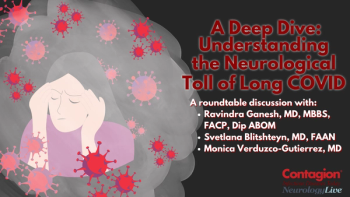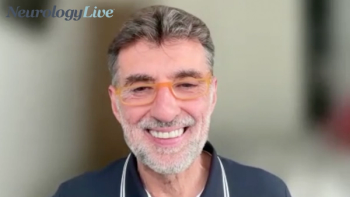
Without a specific tailored Long COVID therapy, individualized treatment based on patient phenotypes, along with extensive evaluations, is essential for effective symptom management.

Isabella Ciccone, Content Associate, NeurologyLive®, has been with the team since September 2022. Follow her on X @iciccone7 or email her at [email protected]

Without a specific tailored Long COVID therapy, individualized treatment based on patient phenotypes, along with extensive evaluations, is essential for effective symptom management.

As part of our monthly clinician spotlight, NeurologyLive® highlighted movement disorder expert Sana Aslam, DO, an assistant professor of neurology at University of Colorado School of Medicine.

In our latest roundtable series, experts highlighted research showing that even mild COVID can result in cognitive impairment including brain fog and IQ decline.

The new guideline emphasized the importance of screening for risk factors and promoted healthy lifestyle changes to reduce the risk of stroke, which impacts over half a million patients in the United States.

The director of Child Neurology and Pediatric Sleep Medicine at Geisinger Janet Weis Children's Hospital provided her immediate reaction to the approval of a once-nightly sodium oxybate for pediatric narcolepsy. [WATCH TIME: 7 minutes]

A recent analysis of the phase 3 ADHERE trial demonstrated the clinical benefit of subcutaneous efgartigimod PH20 in patients with chronic inflammatory demyelinating polyneuropathy.

The chief of the Sleep Disorders Clinical Research Program at Massachusetts General Hospital talked about the new clinical guidelines for treating restless legs syndrome which emphasize the risks of dopamine agonists and advocate for alternative therapies. [WATCH TIME: 8 minutes]

A new analysis revealed zilucoplan’s long-term efficacy and safety in patients with generalized myasthenia gravis, with data extending to 120 weeks of treatment.

Findings showed that both fixed cycles and every-other-week dosing regimens of efgartigimod were well tolerated and effective in improving clinical outcomes in patients with generalized myasthenia gravis.

Sodium oxybate is the only FDA-approved once-at-bedtime treatment for cataplexy or excessive daytime sleepiness in pediatric patients with narcolepsy.

In clinical trials, patients with Parkinson disease who were treated with foscarbidopa/foslevodopa experienced superior improvement in ON time without dyskinesia compared with oral immediate-release carbidopa/levodopa.

Rozanolixizumab demonstrated efficacy in patients with generalized myasthenia gravis aged at least 65 years, despite a higher incidence of comorbidities observed in this population.

The chief of the Sleep Disorders Clinical Research Program at Massachusetts General Hospital discussed the newly updated treatment guidelines for the treatment of restless legs syndrome.

A new analysis of the phase 3 PROPEL study showed that switching to cipaglucosidase alfa/miglustat therapy enhanced outcomes among patients with late-onset Pompe disease.

Using data from observational studies, a recent meta-analysis offered a comprehensive overview of the risk profile of cardiovascular comorbidities in patients with myasthenia gravis.

A new study presented at AANEM 2024 revealed that daily dosing of oral edaravone was well tolerated and did not reveal any new safety concerns in patients with amyotrophic lateral sclerosis.

In our latest roundtable series, experts discussed Long COVID prevalence, underreporting, accurate diagnosis, and emphasized that Long COVID serves as an umbrella term.

The director of the Helen and Robert Appel Alzheimer’s Disease Research Institute at Weill Cornell Medicine talked about findings from a recently published study on immune responses to Alzheimer disease risk genes between male and female mice. [WATCH TIME: 4 minutes]

Sarah Anderson, PharmD, NBC-HWC, senior director of clinical resources and programming at National MS Society, talked about the significant updates under the Inflation Reduction Act to come in 2025 for patients with multiple sclerosis.

The senior director of clinical resources and programming at National MS Society discussed the significant updates to Medicare Part D in 2025 that will cap annual out-of-pocket costs and introduce a flexible payment plan option for enrollees. [WATCH TIME: 9 minutes]

Catch up on any of the neurology news headlines you may have missed over the course of September 2024, compiled all into one place by the NeurologyLive® team.

The postdoctoral research assistant at Charité University Berlin discussed how the new diagnostic criteria for multiple sclerosis could offer earlier detection, especially in those with overlapping autoimmune conditions, through advanced imaging markers.

The hope is that NP001 could potentially slow the progression of the disease through its unique immunologic mechanism.

The chair of neurology at Hospital Universitari Vall d’Hebron talked about the revision of the MS diagnostic criteria that will integrate new evidence, biological markers, and advanced MRI findings to enable earlier and more precise diagnoses. [WATCH TIME: 4 minutes]

The orphan medicinal product designation given by the European Commission was based on findings produced in research funded by the United States Department of Defense.

The assistant professor at the University of Naples discussed how implementation of new diagnostic criteria for multiple sclerosis will involve practical adjustments in imaging and diagnostic techniques as well as cultural changes in clinical practice. [WATCH TIME: 4 minutes]

Ongoing analysis of vamorolone's effects as a mineralocorticoid receptor antagonist in healthy adults is underway, with results to be presented at upcoming medical conferences.

The neurologist at the University Hospital Center of Nice discussed whether radiologically isolated syndrome represents a pre-symptomatic phase of multiple sclerosis based on a hot topic session held at the 2024 ECTRIMS Congress. [WATCH TIME: 4 minutes]

A duo of experts talked about a positive phase 2 trial of vidofludimus calcium, demonstrating reductions in serum neurofilament light levels and potentially slowing brain atrophy in patients with progressive multiple sclerosis. [WATCH TIME: 4 minutes]

A recent survey showed that patients with Parkinson disease quickly adapted to using continuous subcutaneous apomorphine infusion therapy, with high amount of recommending the device to others.